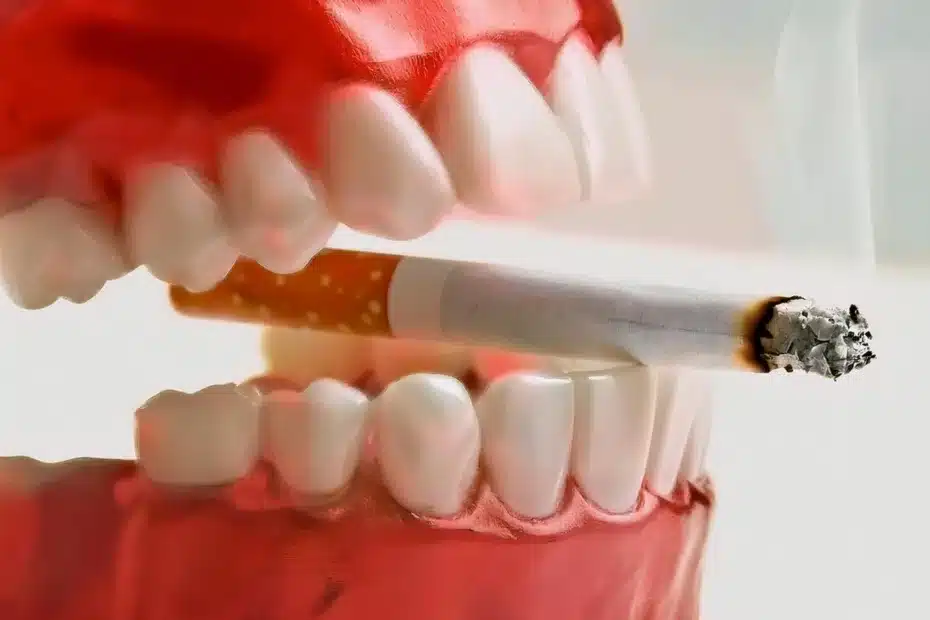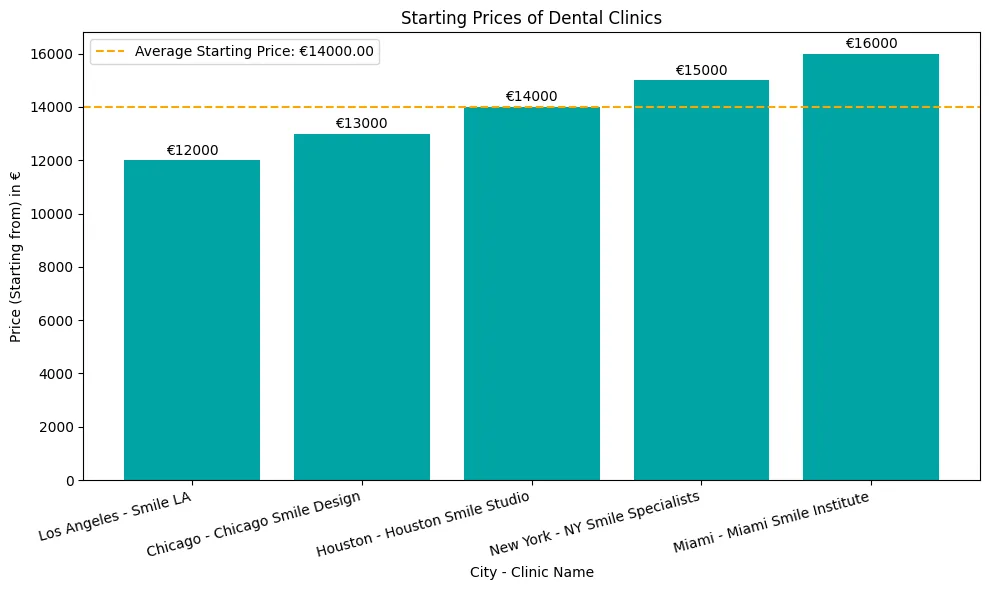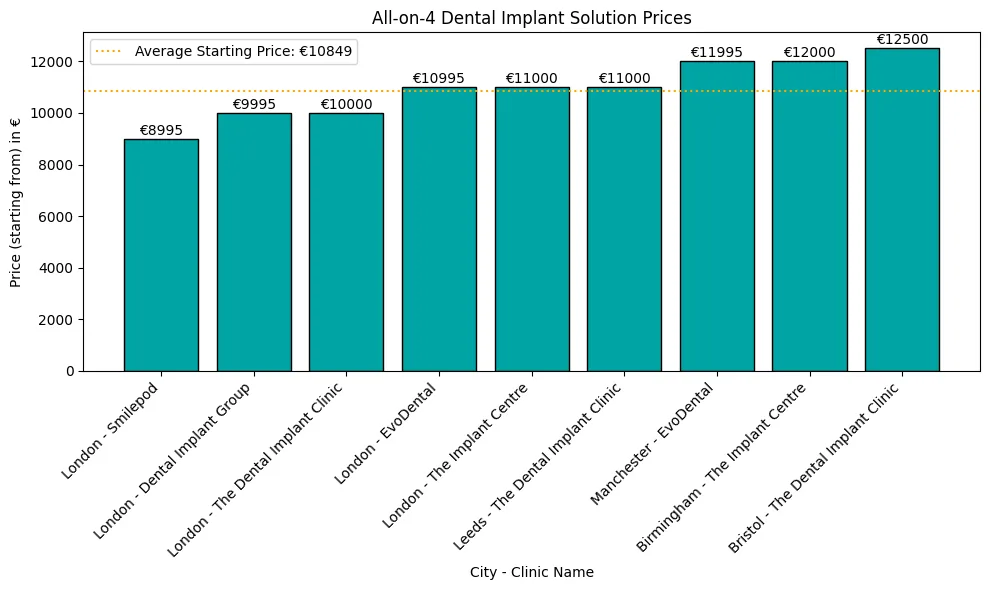Wenn Sie ein Raucher sind und erwägen ZahnimplantateSie sind wahrscheinlich besorgt über die Auswirkungen des Zigarettenrauchens auf den Erfolg Ihres Verfahrens.
Kann Rauchen wirklich die Langlebigkeit und Stabilität Ihrer Zahnimplantate beeinträchtigen, und welche spezifischen Risiken sollten Sie beachten?
Kann Rauchen Ihre Zahnimplantate beeinträchtigen?
Rauchen kann sich auf Zahnimplantate auswirken, da es den Heilungsprozess des Zahnfleisches und des Kieferknochens um das Implantat herum beeinträchtigt, was das Risiko einer Infektion und eines Implantatversagens erhöhen kann. Zahnimplantate und Schwangerschaftda beide Erkrankungen besondere Aufmerksamkeit für die Heilung und die allgemeine Gesundheit erfordern.
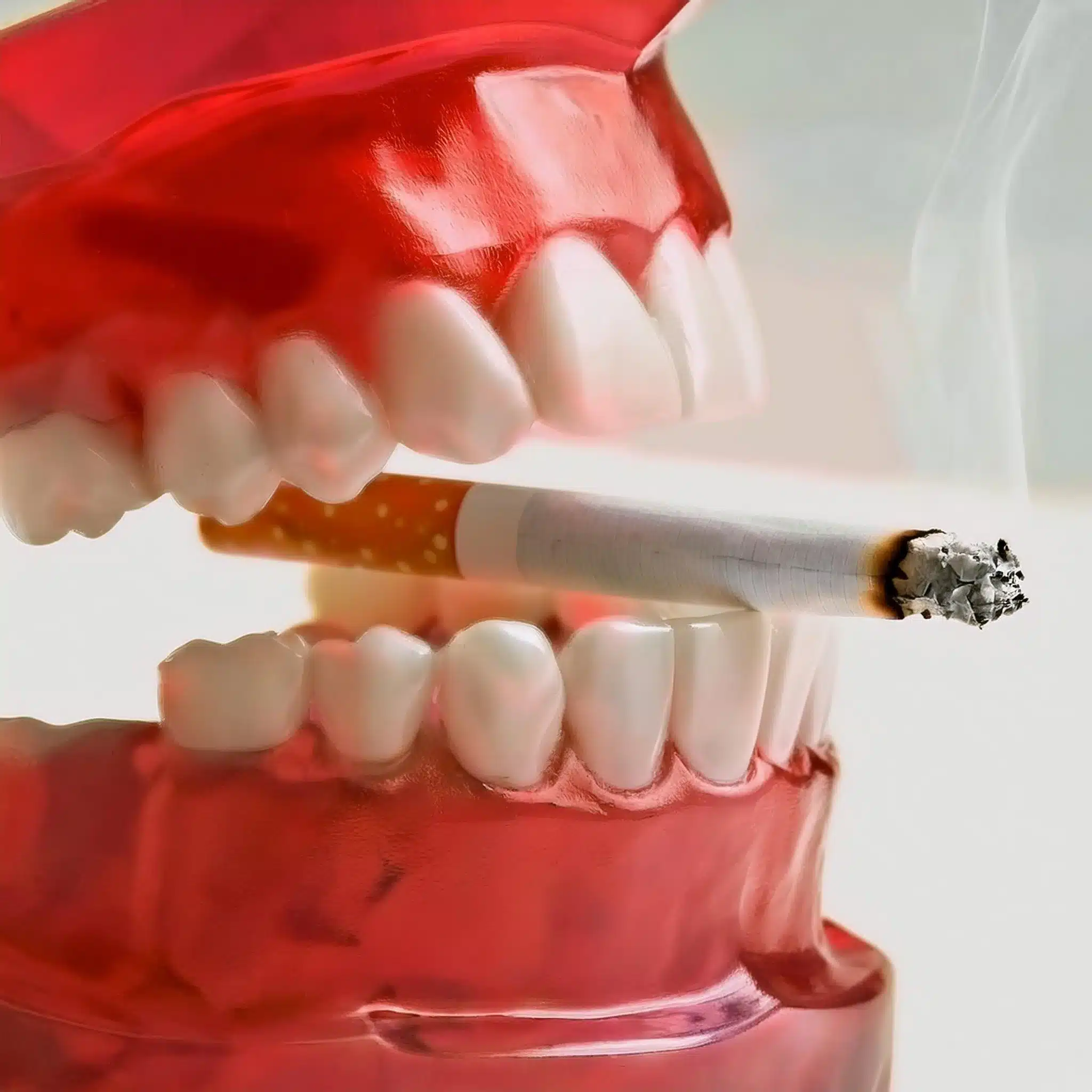
Wie hoch ist das Risiko, dass Zahnimplantate bei Rauchern versagen?
Für Raucher bestehen mehrere erhöhte Risiken bei Zahnimplantaten, darunter ein höheres Risiko, dass Zahnimplantate versagen.
Hier sind die wichtigsten Risiken:
Höhere Misserfolgsquote
Raucher haben eine viel höhere Ausfallrate als Nichtraucher. Der gestörte Heilungs- und Integrationsprozess kann dazu führen, dass das Implantat nicht richtig im Kieferknochen verankert wird.(1)
Rauchen erhöht das Risiko eines frühzeitigen Implantatversagens erheblich und beeinträchtigt sowohl die Integration des Implantats als auch die allgemeine Mundgesundheit.
Periimplantitis
Dabei handelt es sich um eine Entzündung des Weich- und Hartgewebes um das Implantat herum. Raucher sind anfälliger für Periimplantitis, die zu Knochenverlust und Implantatinstabilität führen kann. Das Risiko einer Periimplantitis ist bei Rauchern aufgrund der negativen Auswirkungen des Tabakkonsums auf die Mundhygiene und die Osseointegration von Implantaten höher.

Verzögerte Heilung
Die Heilung verläuft bei Rauchern langsamer, da das Gewebe weniger durchblutet wird und weniger Sauerstoff erhält. Dies kann das Risiko von Komplikationen erhöhen und die Genesungszeit verlängern.(3)
Erhöhtes Infektionsrisiko
Raucher haben ein höheres Risiko einer Infektion an der Implantatstelle. Infektionen können den Heilungsprozess beeinträchtigen und zum Versagen des Implantats führen.
Knochenverlust
Rauchen kann den Knochenabbau um das Implantat herum beschleunigen, was die Stützstruktur schwächt und das Risiko eines Versagens mit der Zeit erhöht.
Kürzere Lebenserwartung
Selbst wenn das Implantat zunächst erfolgreich ist, sind der langfristige Erfolg und die Lebensdauer von Zahnimplantaten bei Rauchern aufgrund der anhaltenden Schädigung der Mundgesundheit geringer.
Mit diesem Wissen können Raucher besser verstehen, mit welchen Herausforderungen sie bei Zahnimplantaten konfrontiert sind und wie wichtig es ist, das Rauchen aufzugeben oder zu reduzieren, um ihre Erfolgschancen zu erhöhen.(5)
| Risikofaktor | Beschreibung | Auswirkungen auf den Implantaterfolg |
|---|---|---|
| Höhere Misserfolgsquote | Raucher haben im Vergleich zu Nichtrauchern eine signifikant höhere Rate an Implantatversagen aufgrund einer beeinträchtigten Einheilung und Integration. | Die Implantate können nicht richtig verankert werden, was zum Versagen führt. |
| Periimplantitis | Entzündung des Gewebes um das Implantat, die bei Rauchern häufiger auftritt und zu Knochenschwund und Instabilität führt. | Kann zu Instabilität und Versagen des Implantats führen. |
| Verzögerte Heilung | Die verminderte Durchblutung und Sauerstoffversorgung des Gewebes bei Rauchern verlangsamt den Heilungsprozess. | Erhöht das Risiko von Komplikationen und verlängert die Erholungszeit. |
| Erhöhtes Infektionsrisiko | Raucher haben ein höheres Risiko einer Infektion an der Implantatstelle, was die Heilung beeinträchtigt. | Infektionen können zum Versagen des Implantats führen. |
| Knochenverlust | Rauchen beschleunigt den Knochenabbau um das Implantat und schwächt dessen Stützstruktur. | Erhöht mit der Zeit das Risiko eines Implantatversagens. |
Kann eine Raucherentwöhnung den Implantaterfolg verbessern?
Ja, die Raucherentwöhnung kann den Erfolg einer Zahnimplantatbehandlung verbessern:
Schnellere Heilung
Wenn Sie mit dem Rauchen aufhören, werden Zahnfleisch und Knochen besser durchblutet und mit Sauerstoff versorgt, was eine bessere Heilung nach dem Einsetzen des Implantats ermöglicht.
Dieser schnellere Heilungsprozess unterstützt die Osseointegration und erhöht die Erfolgsaussichten.
Geringeres Infektionsrisiko
Der Verzicht auf das Rauchen stärkt das Immunsystem und verringert das Risiko einer Infektion an der Implantatstelle.
Eine gesündere Immunantwort beugt Komplikationen vor und unterstützt den Heilungsprozess.(6)
Stabilisierter Knochen
Wenn Sie mit dem Rauchen aufhören, verlangsamt sich der Knochenabbau, so dass das Implantat ein stabileres und sichereres Fundament hat.
Diese Stabilität ist der Schlüssel zum langfristigen Erfolg und zur Haltbarkeit von Zahnimplantaten.
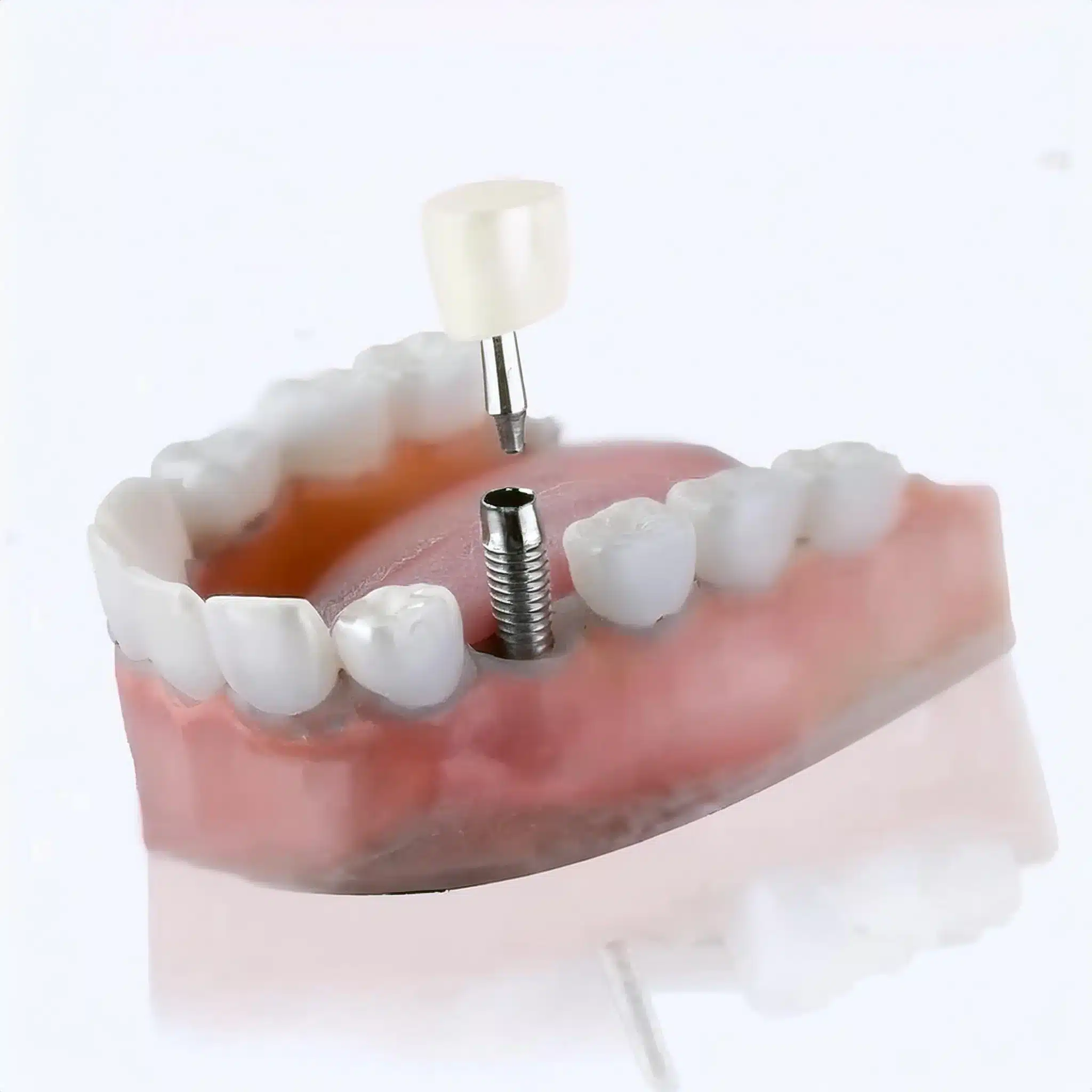
Gesünderes Zahnfleisch
Gesundes Zahnfleisch ist die Voraussetzung für Zahnimplantate.
Wenn Sie mit dem Rauchen aufhören, verringert sich das Risiko einer Zahnfleischerkrankung, die die Stabilität des Implantats beeinträchtigen und zu einem Ausfall führen kann.
Wer kann Zahnimplantate bekommen? Im Allgemeinen kann jeder, der über einen guten allgemeinen Gesundheitszustand und eine ausreichende Knochendichte verfügt, ein Kandidat für Zahnimplantate sein.
Bestimmte Gesundheitszustände und Medikamente können jedoch den Erfolg des Verfahrens beeinträchtigen.
Was Raucher tun können, um den Implantaterfolg zu steigern
Sprechen Sie mit Ihrem Zahnarzt: Besprechen Sie vor der Implantation Ihre Rauchgewohnheiten mit Ihrem Zahnarzt, der auf Implantologie spezialisiert ist.

Sie können Sie gezielt beraten und bei der Raucherentwöhnung unterstützen.
Kündigungsdatum festlegen: Legen Sie einen Termin fest, an dem Sie mit dem Rauchen aufhören, und zwar lange vor Ihrer Implantatoperation.
So hat Ihr Körper Zeit, den Heilungsprozess einzuleiten.
Unterstützungssysteme verwenden: Ziehen Sie Nikotinersatztherapien, Medikamente oder Beratung in Betracht, um mit dem Rauchen aufzuhören.
Gute Mundhygiene: Putzen Sie regelmäßig Ihre Zähne und verwenden Sie Zahnseide, um Ihren Mund gesund zu halten. (4)
Befolgen Sie alle postoperativen Anweisungen Ihres Zahnarztes.
Nach der Operation nicht rauchen: Rauchen Sie während der Heilungsphase nicht, damit sich das Implantat gut erholen und integrieren kann.
Wenn Raucher mit dem Rauchen aufhören und diese Tipps befolgen, können sie ihre Chancen auf ein erfolgreiches Implantatverfahren erhöhen und ein gesundes, funktionelles Lächeln haben.
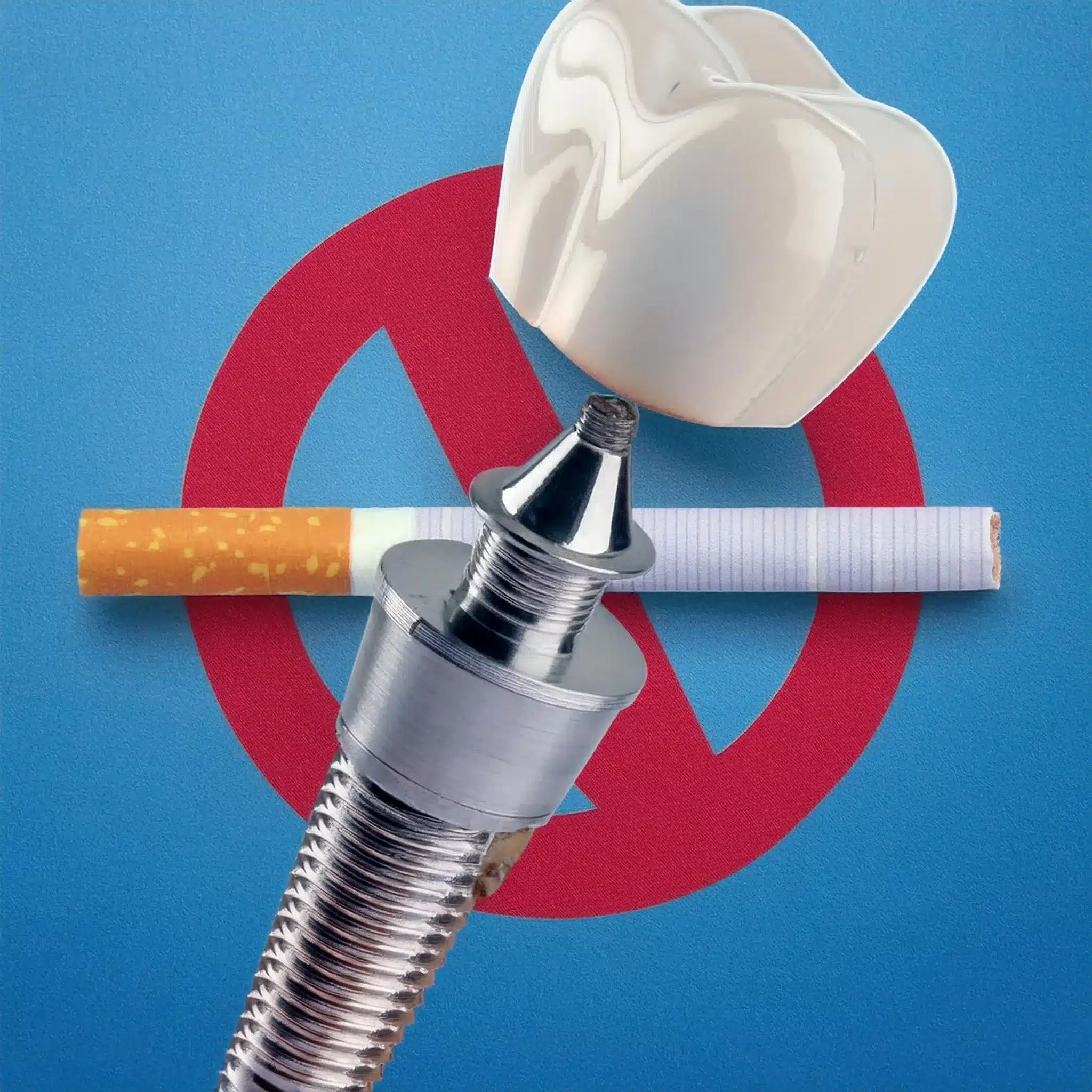
Schlussfolgerung und wichtige Erkenntnisse - Takeaways
Wichtigste Erkenntnisse:
Auswirkungen des Rauchens: Rauchen stört die Einheilung und führt zu höheren Ausfallraten, Periimplantitis, verzögerter Einheilung, erhöhtem Infektionsrisiko, Knochenverlust und einer kürzeren Lebensdauer der Implantate.
Vorteile des Aufhörens: Der Verzicht auf das Rauchen fördert eine schnellere Heilung, verringert das Infektionsrisiko, stabilisiert den Knochen und sorgt für gesünderes Zahnfleisch - all dies trägt zum langfristigen Erfolg und zur Haltbarkeit von Zahnimplantaten bei.(1)
Aktionsschritte für Raucher:
Sprechen Sie mit Ihrem Zahnarzt über Ihre Rauchgewohnheiten.
Legen Sie vor der Implantatoperation einen Termin für den Ausstieg fest.
Nutzen Sie Unterstützungssysteme wie Nikotinersatztherapien, Medikamente oder Beratungsangebote.
Achten Sie auf eine gute Mundhygiene und befolgen Sie die postoperativen Anweisungen.
Vermeiden Sie nach der Operation das Rauchen, um eine gute Erholung und Integration des Implantats zu gewährleisten.
Schlussfolgerung
Rauchen hat erhebliche Auswirkungen auf den Erfolg von Zahnimplantaten und erhöht das Risiko einer verzögerten Einheilung, einer Infektion, eines Knochenverlusts und eines Implantatversagens.
Für Menschen, die eine Zahnimplantation in Erwägung ziehen oder sich einer solchen unterziehen, kann die Aufgabe des Rauchens jedoch einen erheblichen Unterschied machen.(2)
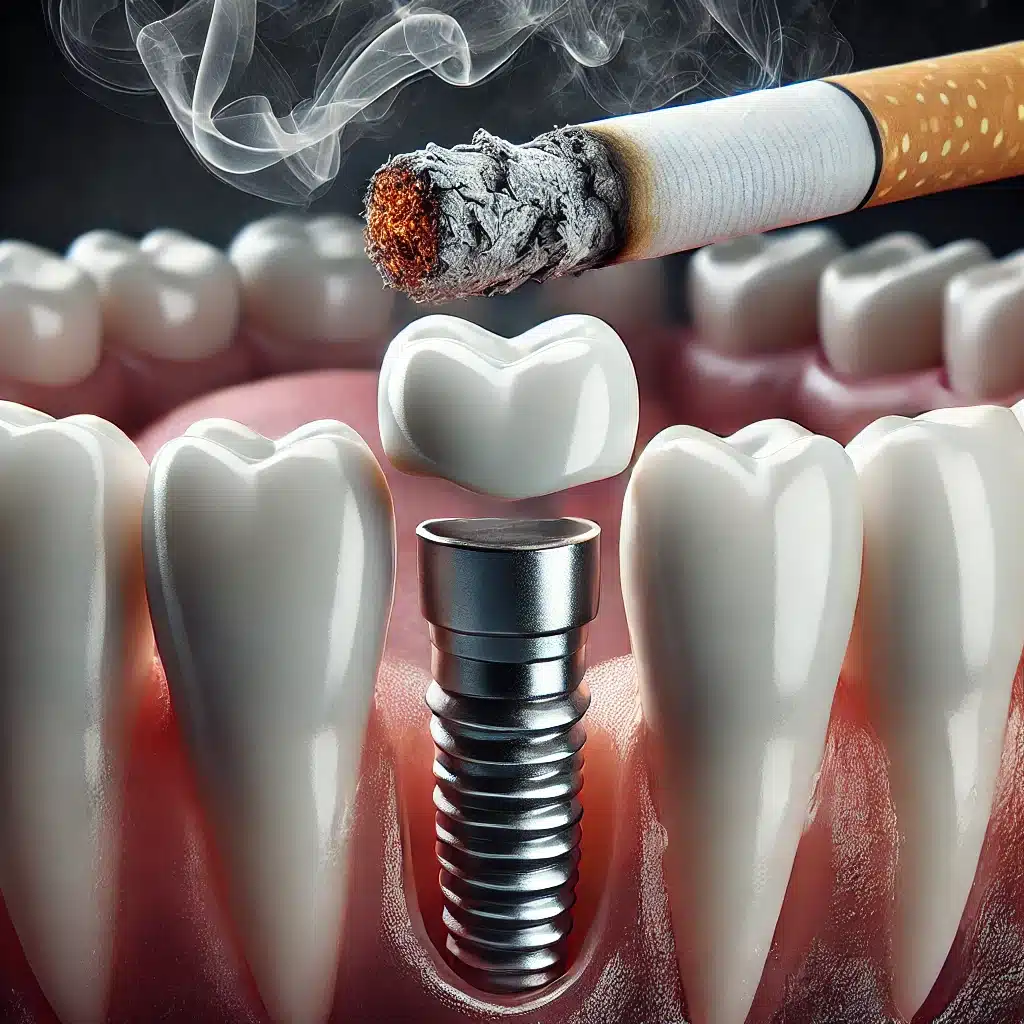
FAQ
Referenzen
(1) Esposito M, Grusovin MG, Coulthard P, et al. Interventionen zum Ersatz fehlender Zähne: Zahnimplantate in frischen Extraktionsalveolen. Cochrane Database Syst Rev. 2006;(3):CD005968.
Artikel: Eingriffe zum Ersatz fehlender Zähne: Zahnimplantate in frischen Extraktionsalveolen
(2) Panchal M, Khare S, Khamkar P, et al. Dental implants: Ein Überblick über Arten, Designanalyse, Materialien, additive Fertigungsmethoden und zukünftige Möglichkeiten. Procedia CIRP. 2022;105:214-219.
(3) Guillaume B. Zahnimplantate: A review. J Stomatol Oral Maxillofac Surg. 2016;117(6):407-411.
Artikel: Zahnimplantate: Ein Überblick
(4) Albrektsson T, Zarb G, Worthington P, et al. The long-term efficacy of currently used dental implants: a review and proposed criteria of success. Int J Oral Maxillofac Implants. 1986;1(1):11-25.
(5) Buser D, Sennerby L, De Bruyn H. Modern implant dentistry based on osseointegration: 50 Jahre Fortschritt, aktuelle Trends und offene Fragen. Parodontol 2000. 2017;73(1):7-21.
(6) Lindhe J., Meyle J. Periimplantäre Erkrankungen: Konsensbericht des Sechsten Europäischen Workshops für Parodontologie. J Clin Periodontol. 2008;35(8 Suppl):282-285.
Artikel: Periimplantäre Erkrankungen: Konsensbericht des Sechsten Europäischen Workshops für Parodontologie

